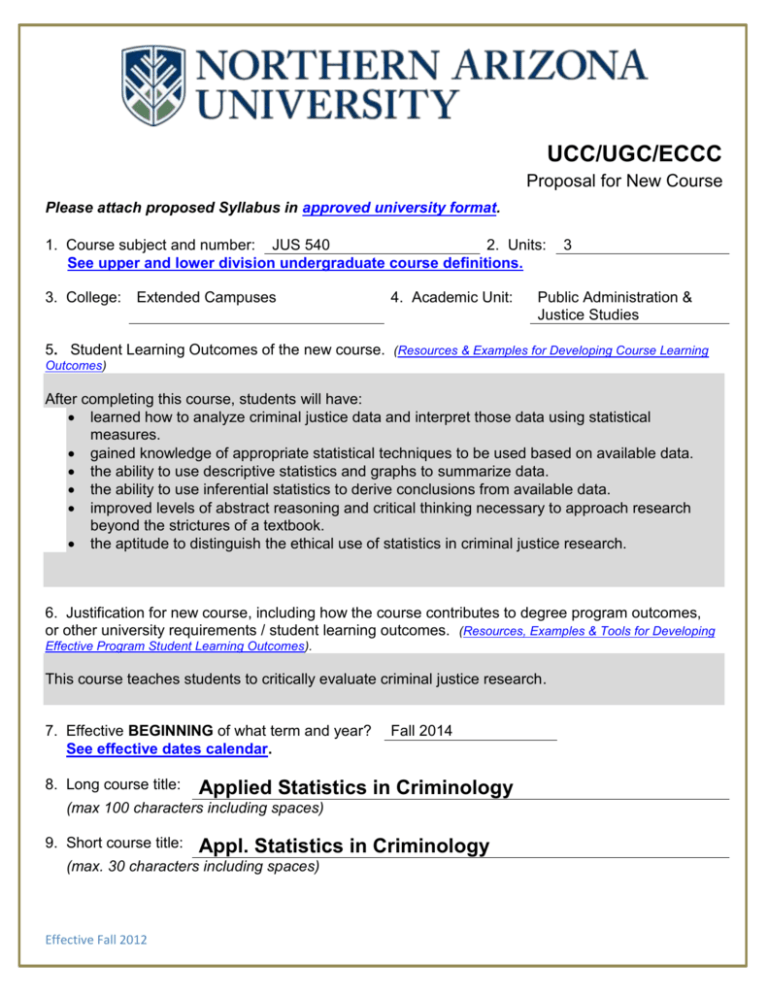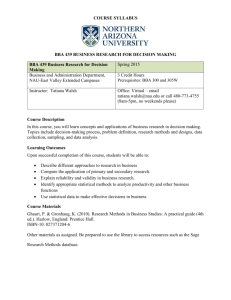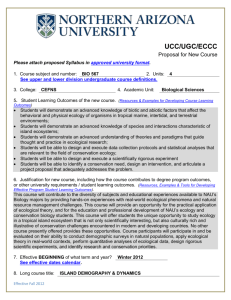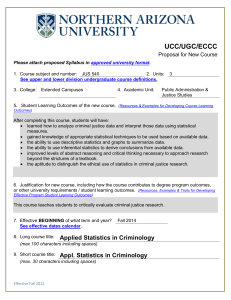JUS 540 Applied Stats in Criminolgy New Course Form
advertisement

UCC/UGC/ECCC Proposal for New Course Please attach proposed Syllabus in approved university format. 1. Course subject and number: JUS 540 2. Units: See upper and lower division undergraduate course definitions. 3. College: Extended Campuses 4. Academic Unit: 3 Public Administration & Justice Studies 5. Student Learning Outcomes of the new course. (Resources & Examples for Developing Course Learning Outcomes) After completing this course, students will have: learned how to analyze criminal justice data and interpret those data using statistical measures. gained knowledge of appropriate statistical techniques to be used based on available data. the ability to use descriptive statistics and graphs to summarize data. the ability to use inferential statistics to derive conclusions from available data. improved levels of abstract reasoning and critical thinking necessary to approach research beyond the strictures of a textbook. the aptitude to distinguish the ethical use of statistics in criminal justice research. 6. Justification for new course, including how the course contributes to degree program outcomes, or other university requirements / student learning outcomes. (Resources, Examples & Tools for Developing Effective Program Student Learning Outcomes). This course teaches students to critically evaluate criminal justice research. 7. Effective BEGINNING of what term and year? See effective dates calendar. 8. Long course title: Fall 2014 Applied Statistics in Criminology (max 100 characters including spaces) 9. Short course title: Appl. Statistics in Criminology (max. 30 characters including spaces) Effective Fall 2012 10. Catalog course description (max. 60 words, excluding requisites): This course is designed to introduce students to applied statistical techniques in the field of criminology and criminal justice. The course offers students the opportunity to apply appropriate statistical analysis to criminal justice research and interpret statistical results, with an emphasis on descriptive and inferential statistics, and measures of significance. 11. Will this course be part of any plan (major, minor or certificate) or sub plan (emphasis)? Yes If yes, include the appropriate plan proposal. No 12. Does this course duplicate content of existing courses? Yes No If yes, list the courses with duplicate material. If the duplication is greater than 20%, explain why NAU should establish this course. 13. Will this course impact any other academic unit’s enrollment or plan(s)? Yes No If yes, describe the impact. If applicable, include evidence of notification to and/or response from each impacted academic unit 14. Grading option: Letter grade Pass/Fail Both 15. Co-convened with: N/A 14a. UGC approval date*: (For example: ESE 450 and ESE 550) See co-convening policy. *Must be approved by UGC before UCC submission, and both course syllabi must be presented. 16. Cross-listed with: N/A (For example: ES 450 and DIS 450) See cross listing policy. Please submit a single cross-listed syllabus that will be used for all cross-listed courses. 17. May course be repeated for additional units? 16a. If yes, maximum units allowed? 16b. If yes, may course be repeated for additional units in the same term? 18. Prerequisites: Undergraduate Statistics Course If prerequisites, include the rationale for the prerequisites. Admission into the MA program. 19. Co requisites: If co requisites, include the rationale for the co requisites. Effective Fall 2012 Yes No Yes No 20. Does this course include combined lecture and lab components? Yes If yes, include the units specific to each component in the course description above. 21. Names of the current faculty qualified to teach this course: No Kurt Fenske, Jennifer Ferguson Answer 22-23 for UCC/ECCC only: 22. Is this course being proposed for Liberal Studies designation? If yes, include a Liberal Studies proposal and syllabus with this proposal. Yes 23. Is this course being proposed for Diversity designation? If yes, include a Diversity proposal and syllabus with this proposal. Yes FLAGSTAFF MOUNTAIN CAMPUS Reviewed by Curriculum Process Associate Date Approvals: Department Chair/Unit Head (if appropriate) Date Chair of college curriculum committee Date Dean of college Date For Committee use only: UCC/UGC Approval Date Approved as submitted: Yes No Approved as modified: Yes No Effective Fall 2012 No No EXTENDED CAMPUSES Jenny Scott 9.20.13 Reviewed by Curriculum Process Associate Date Approvals: Academic Unit Head Date Division Curriculum Committee (Yuma, Yavapai, or Personalized Learning) Date Division Administrator in Extended Campuses (Yuma, Yavapai, or Personalized Learning) Date Faculty Chair of Extended Campuses Curriculum Committee (Yuma, Yavapai, or Personalized Learning) Date Chief Academic Officer; Extended Campuses (or Designee) Date Approved as submitted: Yes No Approved as modified: Yes No Effective Fall 2012 Department of Public Administration and Justice Studies JUS 540 – Applied Statistics in Criminology (3 credit hours) Fall 2014 (Dates of course to be specified by instructor) Instructor: Contact information: Course Pre-requisites: Undergraduate level course in statistics When you can measure what you are speaking about, and express it in numbers, you know something about it; but...when you cannot express it in numbers, your knowledge is of a meager and unsatisfactory kind. -William Thomson (aka Lord Kelvin) Course Description This course is designed to introduce students to applied statistical techniques in the field of criminology and criminal justice. The course offers students the opportunity to apply appropriate statistical analysis to criminal justice research and interpret statistical results, with an emphasis on descriptive and inferential statistics, and measures of significance This course will allow students to interpret and draw conclusions from data using statistical measures. Students are expected to have a general level of knowledge of statistical concepts, as this course will focus on the practical application of statistical techniques. Effective Fall 2012 Student Learning Objectives After completing this course, students will have: - learned how to analyze criminal justice data and interpret those data using statistical measures. gained knowledge of appropriate statistical techniques to be used based on available data. the ability to use descriptive statistics and graphs to summarize data. the ability to use inferential statistics to derive conclusions from available data. improved levels of abstract reasoning and critical thinking necessary to approach research beyond the strictures of a textbook. - the aptitude to distinguish the ethical use of statistics in criminal justice research. Course Structure This section is to be determined by the instructor and based on the format and delivery method, e.g. in person, hybrid, or online in 5-, 7-, 8-, 10- or 16-week length. [Note: The Department of Public Administration and Justice Studies requires the following for Master level courses: - Reading – at least 500 pages of reading, consisting mainly of journal articles and books by the original authors - Writing – a minimum of 20 pages of written work - Participation activities (e.g. Discussions, blogs, group work) – should not constitute more than 25% of the overall allotted points for the course) - Testing – at least one testing components to ensure learning objectives have been achieved - Independent research/examination of the material by the student] This section of the syllabus also will state the due date/late submission policy and also list whether there will be extra credit opportunities as determined by the instructor. Textbook and Required Materials Faculty committee to determine the required text and each instructor determines any additional required materials for the course. Effective Fall 2012 Recommended optional materials/references Instructor determines any optional/recommended materials for the course. Course Outline [Note: This section of the syllabus will list each individual learning module (depending on the format and delivery method, e.g. in person, hybrid, or online in 5-, 7-, 8-, 10- or 16-week length).] Example… Learning Module 1: [Module Due Date: (to be determined/specified by instructor)] Reading assignment: (to be specified by instructor) Activities due: * Module 1 Discussions * Module 1 Assignment Paper Etc…….. Assessment of Student Learning Outcomes A. Ability to explain how to analyze criminal justice data and interpret those data using statistical measures. Demonstrated through written assignments, participation activities, and on assessments (exams or quizzes). B. Employ descriptive and inferential statistics to Demonstrated through written Effective Fall 2012 summarize and analyze data. assignments, participation activities, and on assessments (exams or quizzes). C. Ability to identify the most appropriate statistical techniques to be used based on available data. Demonstrated through written assignments and participation activities. D. Distinguish and explain the ethical use of statistics in criminal justice research. Demonstrated through written assignments and participation activities. E. Improvement of abstract reasoning, critical thinking, and communication skills in explaining the implications and effects of statistical research in criminology. Demonstrated through written assignments and participation activities. Grading System [Example…point allocation to be determined by instructor based on assignments] Participation Activities points Writing Assignments points Exams/Quizzes points Total points In general, to earn at least a 90% (an ‘A’) on any assignment/activity, and the course overall, a student must do “Excellent” work. To receive at least 80% (a ‘B’), a student must do “Good”, or “Above Average” work. To receive at least 70% (a ‘C’), a student must do no less than “Average” work. Work that is assessed as “Below Average” will receive a ‘D’ or lower. Effective Fall 2012 Course Grades will be based on the following overall percents/points earned: A 90-100% (x-x points) B 80-89% (x-x points) C 70-79% (x-x points) D 60-69% (x-x points) F 0-59% (x-x points) Course Policies 1) This is a Master level university course, which implies the following: There is a significant amount of reading; in short format courses, this reading may seem more arduous than in a regular semester, but the reading needs to be completed diligently. The purpose of these assigned readings is to provide you with information to expand your knowledge and provide supporting material to complete the required activities in each learning module. Assigned readings should be completed prior to attempting the activities throughout the course. All assignments need to be well-written (words properly spelled, complete sentences, etc.). Double-check your work before submitting any assignment. Your answers and arguments should be well-organized, well-written, and demonstrate thoughtful reflection. 2) In online courses, it is important to recognize that most communication is held via the written word. Please be mindful of the fact that written communication is different from face-to-face communication; in written communication we lack the ability to see non-verbal cues that help us place our verbal speech in context, and without these non-verbal cues it makes it more difficult to determine the tone of the writer, and sometimes the intent. Also, on occasion some people write statements that they would not feel comfortable saying in a face-to-face conversation. Please take these and other differences you have noticed into account when communicating in this class. For the record: All perspectives and views are welcome in this class, with the exception of overtly offensive remarks and writings which violate standards of academic pursuits and are intended to cause discomfort to others. Effective Fall 2012 3) The use of outside sources for information that will enhance your ideas certainly is welcome and expected. As you should be well aware at this point in your academic career , there are a few “rules” that need to be followed: Outside information should be used to support/enhance your position and ideas – the activities in this course are designed for you to demonstrate that you understand the materials and are able to explain that understanding in your own words; If you use outside sources, including the assigned readings, you must provide a proper citation and use quotation marks where appropriate. Please see the “Academic Integrity” section in the NAU Policy Statements near the end of this syllabus. Plagiarism (see the websites listed below) will result in a zero for an assignment, and any additional instances will lead to further disciplinary measures. Visit the following websites to become familiar with what is (and is not) plagiarism: NAU’s Department of Criminology and Criminal Justice Plagiarism Tutorial (http://jan.ucc.nau.edu/~pms/plagiarism/) NAU’s e-Learning Center site on academic integrity (http://www2.nau.edu/delearn/support/tutorials/academicintegrity/03_04_WhenInDoubt.php) 4) Please be aware of the dates established by the Registrar’s Office regarding administrative deadlines, such as the date by which to drop the course without it appearing on your transcript and the deadline to withdraw from the course with a ‘W’ (without a petition). 5) Exams/Quizzes must be taken when scheduled. Make-up exams/quizzes will be provided only when a student has approval from the instructor prior to the exam/quiz date, or an extreme emergency causes the student to miss the exam/quiz as scheduled. Documentation of the need to make-up an exam/quiz will need to be provided upon request. 6) Requests for Incompletes will only be considered for instances where extreme “circumstances beyond the student’s control” prevent the student from completing a relatively small portion of the course work; these circumstances must be verified with written documentation for the request to be considered and requests will be considered only in accordance with department policy. Effective Fall 2012 NORTHERN ARIZONA UNIVERSITY POLICY STATEMENTS SAFE ENVIRONMENT POLICY NAU’s Safe Working and Learning Environment Policy seeks to prohibit discrimination and promote the safety of all individuals within the university. The goal of this policy is to prevent the occurrence of discrimination on the basis of sex, race, color, age, national origin, religion, sexual orientation, disability, or veteran status and to prevent sexual harassment, sexual assault or retaliation by anyone at this university. You may obtain a copy of this policy from the college dean’s office or from the NAU’s Affirmative Action website http://www4.nau.edu/diversity/swale.asp. If you have concerns about this policy, it is important that you contact the departmental chair, dean’s office, the Office of Student Life (928-523-5181), or NAU’s Office of Affirmative Action (928523-3312). STUDENTS WITH DISABILITIES If you have a documented disability, you can arrange for accommodations by contacting the office of Disability Support Services (DSS) at 928-523-8773 (voice), 928-523-6906 (TTY). In order for your individual needs to be met, you are required to provide DSS with disability related documentation and are encouraged to provide it at least eight weeks prior to the time you wish to receive accommodations. You must register with DSS each semester you are enrolled at NAU and wish to use accommodations. Faculty are not authorized to provide a student with disability related accommodations without prior approval from DSS. Students who have registered with DSS are encouraged to notify their instructors a minimum of two weeks in advance to ensure accommodations. Otherwise, the provision of accommodations may be delayed. Concerns or questions regarding disability related accommodations can be brought to the attention of DSS or the Affirmative Action Office. For more information, visit the DSS website at http://www2.nau.edu/dss/. INSTITUTIONAL REVIEW BOARD Any study involving observation of or interaction with human subjects that originates at NAU—including a course project, report, or research paper—must be reviewed and approved by the Institutional Review Board (IRB) for the protection of human subjects in research and research-related activities. The IRB meets monthly. Proposals must be submitted for review at least fifteen working days before the monthly meeting. You should consult with your course instructor early in the course to ascertain if your project needs to be reviewed by the IRB and/or to secure information or appropriate forms and procedures for the IRB review. Your instructor and department chair or college dean must sign the application for approval by the IRB. The IRB categorizes projects into three levels depending on the nature of the project: exempt from further review, expedited review, or full board review. If the IRB certifies that a project is exempt from further review, you need not resubmit the project for continuing IRB review as long as there are no modifications in the exempted procedures. A copy of the IRB Policy and Procedures Manual is available in each department’s administrative office and each college dean’s office or on their website: http://www4.nau.edu/ovp/regulatorycompliance/irb/index.htm. If you have questions, contact the Office of Grant and Contract Services, at 928-523-8288. ACADEMIC INTEGRITY The university takes an extremely serious view of violations of academic integrity. As members of the academic community, NAU’s administration, faculty, staff and students are dedicated to promoting an atmosphere of honesty and are committed to maintaining the academic integrity essential to the education process. Inherent in this commitment is the belief that academic dishonesty in all forms violates the basic principles of integrity and impedes learning. Students are therefore responsible for conducting themselves in an academically honest manner. Effective Fall 2012 Individual students and faculty members are responsible for identifying instances of academic dishonesty. Faculty members then recommend penalties to the department chair or college dean in keeping with the severity of the violation. The complete policy on academic integrity is in Appendix G of NAU’s Student Handbook http://www4.nau.edu/stulife/handbookdishonesty.htm. ACADEMIC CONTACT HOUR POLICY The Arizona Board of Regents Academic Contact Hour Policy (ABOR Handbook, 2-206, Academic Credit) states: “an hour of work is the equivalent of 50 minutes of class time…at least 15 contact hours of recitation, lecture, discussion, testing or evaluation, seminar, or colloquium as well as a minimum of 30 hours of student homework is required for each unit of credit.” NOTE: This means you should plan to spend at least 90 hours on “additional work” in each class and all course lengths. In a short 5 or 7 week session, this requires solid time management. The reasonable interpretation of this policy is that for every credit hour, a student should expect, on average, to do a minimum of two additional hours of work per week; e.g., preparation, homework, studying. Effective Fall 2012










